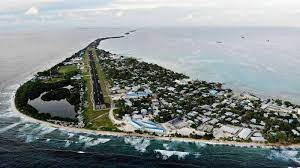Heads of state from Tuvalu and the Marshall Islands have launched a “Rising Nations Initiative” as they race toward solutions to a rising ocean level that will make their countries all but uninhabitable in the coming decades.
By Pia Sarka
While world leaders from wealthy countries acknowledge the “existential threat” of climate change, Tuvalu Prime Minister Kausea Natano is racing to save his tiny island nation from drowning by raising it four to five meters above sea level through land reclamation.
While experts issue warnings about the eventual uninhabitability of the Marshall Islands, President David Kabua must reconcile the inequity of a seawall built to protect one house that is now flooding another one next door.
That is the reality of climate change: Some people get to talk about it from afar, while others must live it every day.
Natano and Kabua tried to show that reality on Wednesday on the sidelines of the UN General Assembly. Together they launched the Rising Nations Initiative, a global partnership aimed to preserve the sovereignty, heritage and rights of Pacific atoll island nations whose very existence have been threatened by climate change.
Natano described how rising sea levels have impacted everything from the soil that his people rely on to plant crops, to the homes, roads and power lines that get washed away. The cost of eking out a living, he said, eventually becomes too much to bear, causing families to leave and the nation itself to disappear.
“This is how a Pacific atoll dies,” Natano said. “This is how our islands will cease to exist.”
The Rising Nations Initiative seeks a political declaration by the international community to preserve the sovereignty and rights of Pacific atoll island countries; the creation of a comprehensive programme to build and finance adaptation and resilience projects to help local communities sustain livelihoods; a living repository of the culture and unique heritage of each Pacific atoll island country; and support to acquire UNESCO World Heritage designation.
The initiative has already gained the support of countries like the United States, Germany, South Korea and Canada, all of which have acknowledged the unique burden that island nations like Tuvalu and the Marshall Islands must shoulder.
A UN Intergovernmental Panel on Climate Change report released in February spelled out the vulnerability of small island developing states and other global hotspots like Africa and South Asia, whose populations are 15 times more likely to die from extreme weather compared to less vulnerable parts of the world.
If warming exceeds a few more tenths of a degree, it could lead to some areas — including some small islands — becoming uninhabitable, said report co-author Adelle Thomas of Climate Analytics and the University of the Bahamas. On Wednesday, Natano noted that Tuvalu and its Pacific neighbors “have done nothing to cause climate change,” with their carbon emission contribution amounting to less than .03% of the world’s total.
“This is the first time in history that the collective action of many nations will have made several sovereign countries uninhabitable,” he said.
Representatives from other nations who attended Wednesday’s event did not deflect responsibility. But whether they will do enough to turn things around remains to be seen.
Several have pledged money to help island nations pay for early warning systems and bring their buildings up to code to better protect them from hurricanes and other weather events. But there was less talk of mitigating the problem of climate change and more about how to adapt to the devastation it has already wrought.
“We see this train coming, and it’s coming down the track, and we need to get out of the way,” said Amy Pope, deputy director general of the International Organisation for Migration.
Germany’s climate envoy, Jennifer Morgan, who also attended Wednesday’s event, spoke of her country’s target to reach carbon neutrality by 2045. But while Germany remains committed to phasing out coal as a power source by 2030, it has had to reactivate coal-fired power plants to get through the coming winter amid energy shortages as a result of Russia’s war in Ukraine.
For the president of the Marshall Islands, wealthy nations could be doing much more. During his speech to the UN General Assembly on Tuesday, Kabua urged world leaders to take on sectors that rely on fossil fuels, including aviation and shipping. He pointed to the Marshall Islands’ carbon levy proposal for international shipping that he says “will drive the transition to zero emission shipping, channeling resources from polluters to the most vulnerable.”
UN Secretary-General Antonio Guterres has likewise encouraged going after the world’s largest polluters. During his opening remarks to the assembly on Tuesday, he pushed for richer countries to tax the profits of energy companies and redirect the funds to both “countries suffering loss and damage caused by the climate crisis” and those struggling with the rising cost of living.
In the meantime, as wealthy countries urge action instead of words in their own UN speeches, Kabua, Natano and their fellow island nation leaders will continue to grapple with their daily climate change reality — and try to continue to exist.
SOURCE: AP/PACNEWS


















